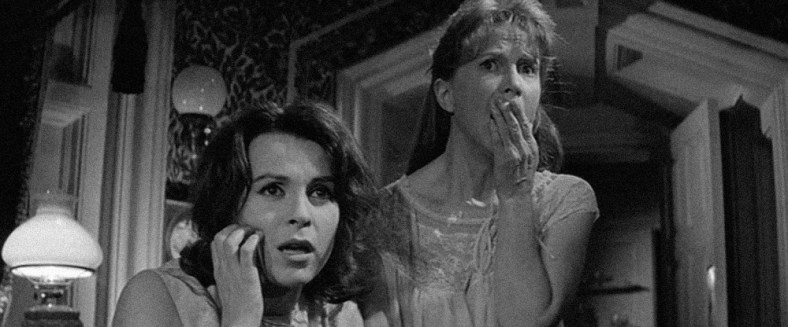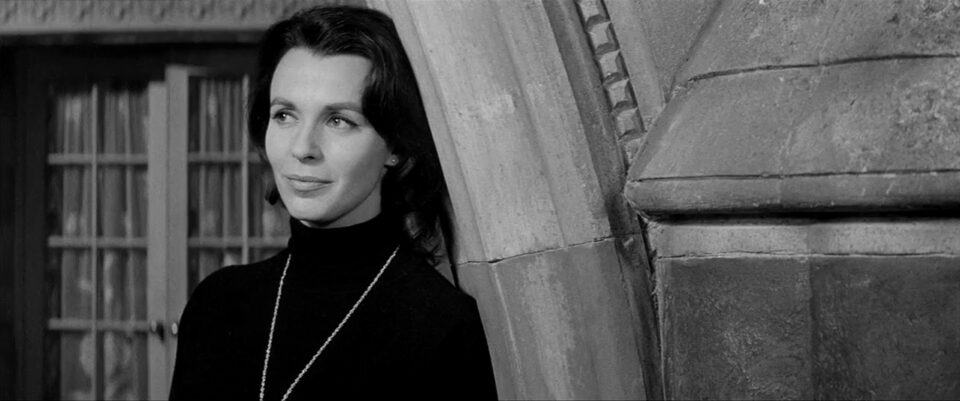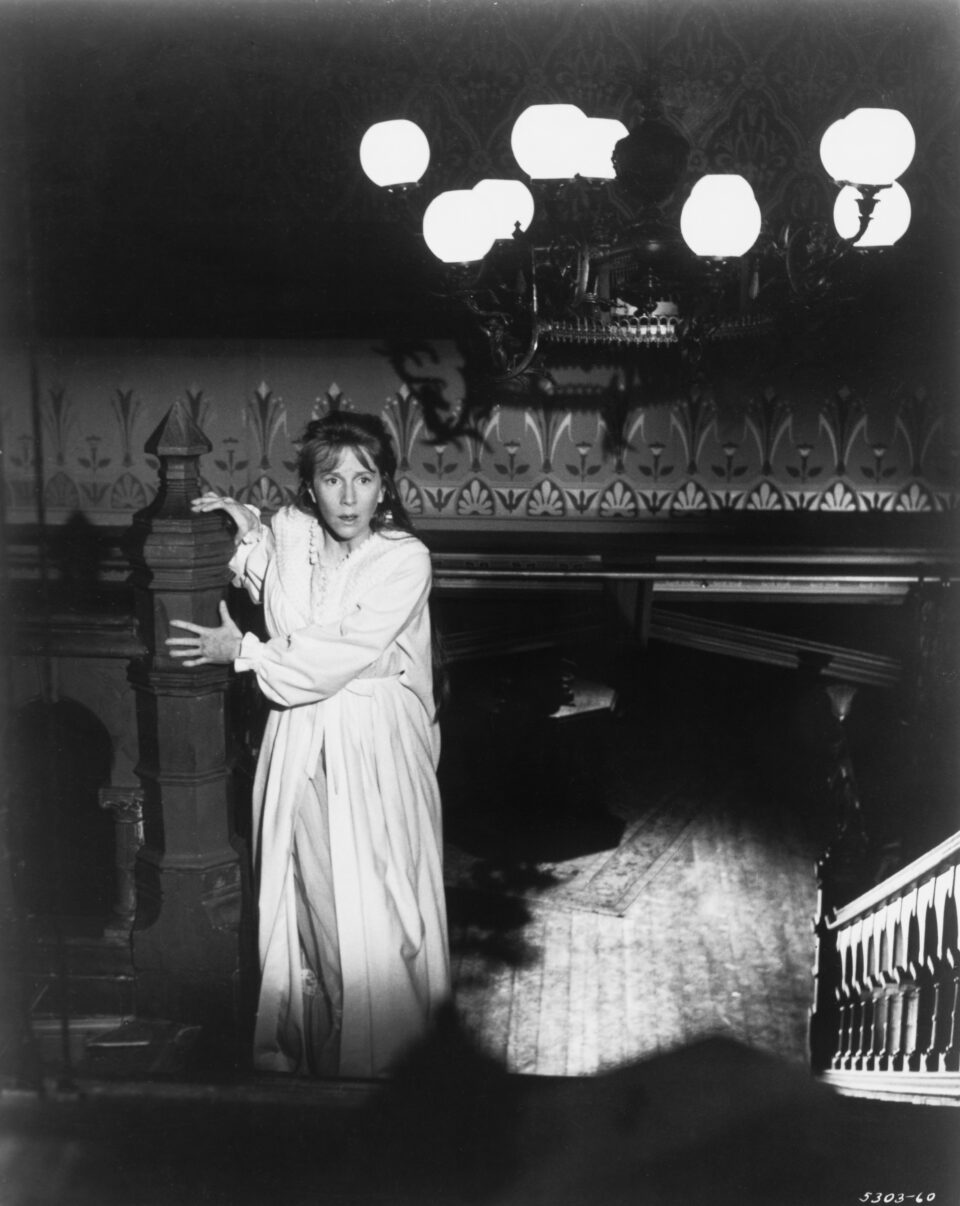And We Who Walk Here Walk Alone: The 60-Year Queer Gothic Legacy of ‘The Haunting ‘

Shirley Jackson’s The Haunting of Hill House stands in the upper echelon of the horror canon not only due to her masterful writing but the memorable characters, well-crafted scares, and capturing the queer aspects of Gothic horror. Outside of existing as a horror classic, it was adapted in 1963 by Robert Wise and Nelson Gidding as The Haunting. Although some elements got shifted and changed for the adaptation, the core queer aspects of the book still existed and were amplified for the film.
More specifically, the queer subtext of the novel transcended and became a textual part of the film. As a result, The Haunting is a foundational piece of the queer horror canon not only for its approach to queer representation but also for its themes and how it falls into the lineage of the Gothic subgenre. With the film approaching its 60th anniversary, I wanted to discuss the queer elements of the work.
A notable element of the Gothic lies in dissecting and representing monstrous behavior and attitudes outside of societal norms. Further, those behaviors and attitudes are physically defined as buildings, houses, and structures. In The Haunting, Hill House stands as the monster of the movie where Eleanor “Nell” Lance (Julie Harris), Theodora “Theo” (Claire Bloom), and others investigate for paranormal activity. In the beginning, Doctor John Markway (Richard Johnson) discusses the various tragedies associated with the house’s history and how it could be haunted.
Immediately, Hill House exists outside of our ordinary reality and in its own space due to the potential of ghosts. Hill House cannot be a typical house but one that queers normalcy by being haunted. Also, paranormal occurrences and ghosts are a common trope in the Gothic where they exist as thematic representations instead of literal spirits. By living in its own space, Hill House allows the characters’ subconsciouses to rise to the surface and haunt them as they investigate the house. However, the Haunting appears to be derived from Nell’s repression and trauma.
Much like in the novel, Theo in the film still retains her lesbian identity, although more explicitly in The Haunting. Presented in very stylish and artistic clothing, she represents a very cosmopolitan lifestyle compared to the others in the film, especially Eleanor. Although the film cut out an introduction scene demonstrating a breakup with her previous girlfriend, Theo’s queerness stands out front and center. She describes her relationship with Eleanor as akin to “sisters” and consistently attempts to further their ties beyond being friends. Theo shows no interest in the male companions of the investigation and feels comfortable being only around Eleanor. She even feels angry at Eleanor when she tells Theo about developing feelings for Dr. Markway.
Notably, Nell discusses with Theo, “Unnatural things. Nature’s mistakes, they’re called. You, for instance!” Despite this, Theo does not exist as a predatory lesbian stereotype but as a three-dimensional character which is even more impressive considering the movie was made in the 1960s. The Haunting does not vilify or damn Theo for being a lesbian and allows her to exist simply.

Conversely, Nell’s sexuality is never explicitly defined. Nell has spent most of her life looking after her sick mother until her death. As a result, Nell lives with her sister’s family and has no real life outside of their home or any honest relationship due to repressing her trauma. Nell constantly guards herself against potential hurt or pain and only feels a genuine kinship with Theo. Nell never mentions having a male romantic partner or being interested in one before Hill House. Even in the case of Dr. Markway appears more akin to him showing her bare attention than true love.
More than anything, Nell desires to have a happy life and escape her troubles despite realizing she cannot. She exists as a prisoner where. After being forced to care for her mother, she does the same for her sister. Nell repressed her anger, fear, hopes, and dreams while letting them boil over internally as Theo cared for her. Her true honest nature only exists in the presence of Theo. Even before her tragic end, her only fulfilling relationship was with the other woman.
As mentioned, Nell’s and Theo’s relationship fluctuates from platonic to romantic. On a pure surface level, it could be as simply two women being friends. But with a queer lens, it provides a much more intimate form of a relationship. Before Hill House, Nell never had a romantic relationship with another person and did not have experience in that department. Having said experience, Theo acts as a guide who gestures and tries to build that romantic relationship.
Initially, they sleep in separate beds before sharing one during one of the scarier episodes of the Haunting. Outside of that, the pair share breakfast and spend much time together while becoming more physically affectionate as the film goes on. Much like with existing Gothic with interest outside of boundaries, so does their relationship. The film never cements in which sphere. It simply ends and allows ambiguity. Yet, the pair do not get a happy ending since it falls under the Gothic subgenre.

Lastly comes Nell’s repression. Her trauma haunts her before Hill House and only becomes more extreme the longer she stays there. Such as the case where the phrase “Help Eleanor come home” appears written on the wall. Hill House exists as a “haven” and eventually the tomb for Nell. Despite the hauntings, her time in Hill House allows Nell to experience a sense of normalcy and replicate the life she missed. But, the terrors always return and remind her of her trauma and repression. The more she attempts to repress her past trauma, the stronger the hauntings become.
Nell realizes she feels a calling, a dark connection to Hill House she cannot fully comprehend. She never felt at home in the real world and constantly tugged towards the realms of the spirits. Nell’s trauma and repression exist as an attempt to hide her true desires and the past dreams she never achieved. As much as she wanted happiness, her mother never allowed it and feels guilty about it. When discussing why Nell drove her car into the tree and killed herself, Theo states, “Maybe not ‘poor Eleanor.’ It was what she wanted. To stay here. She had no place else to go. The house belongs to her now, too. Maybe she’s happier.”
The Haunting and the source novel are my favorite Gothic horror stories. I have reread and re-watched the movie multiple times to the point I have memorized it. In addition, I am grateful for how the film also stands as an essential cornerstone of the queer horror canon. Much like Hill House, The Haunting has stood for over 60 years and will stand there for 60 more.
Categorized:Editorials News

